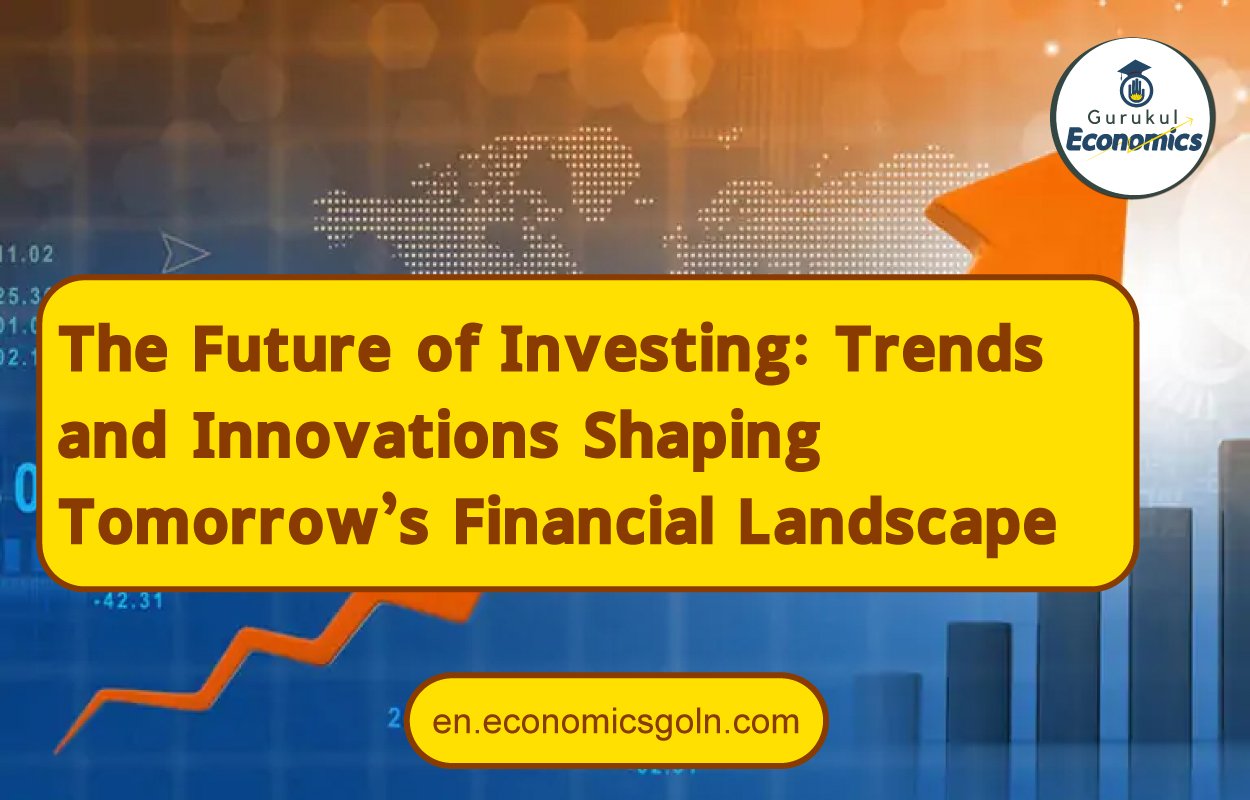Investing has always been a dynamic field, shaped by evolving technologies, economic shifts, and societal changes. As we move into the future, several key trends and innovations are set to redefine how we approach investing. This article explores these transformative changes and their potential impact on the investment landscape.

The Future of Investing
1. The Rise of Digital and Automated Investing
1.1. Robo-Advisors
Robo-advisors have revolutionized the investment space by using algorithms and artificial intelligence to provide automated financial advice. These platforms offer portfolio management with minimal human intervention, making investing more accessible and cost-effective. They analyze your risk tolerance and investment goals to create a customized portfolio, often at a fraction of the cost of traditional financial advisors.
– Advantages: Lower fees, accessibility for beginners, and efficiency in portfolio management.
– Future Outlook: Enhanced AI capabilities will lead to more sophisticated financial planning and personalized investment strategies.
1.2. Algorithmic Trading
Algorithmic trading involves using algorithms to execute trades based on predefined criteria. This method enables high-frequency trading and leverages big data to make split-second decisions that are beyond human capability.
– Advantages: Increased trading efficiency, reduced emotional bias, and the ability to handle large volumes of data.
– Future Outlook: Advancements in machine learning will improve the precision and adaptability of trading algorithms.
2. The Impact of Artificial Intelligence and Machine Learning
2.1. Predictive Analytics
Artificial Intelligence (AI) and machine learning are transforming investment strategies by providing predictive analytics. These technologies analyze vast amounts of historical data to forecast market trends, identify investment opportunities, and assess risks with greater accuracy.
– Advantages: Enhanced market predictions, better risk management, and more informed investment decisions.
– Future Outlook: AI-driven models will become more sophisticated, improving the accuracy of predictions and enabling real-time adjustments.
2.2. Personalized Investment Strategies
AI is also enhancing personalized investment strategies by analyzing individual preferences, financial goals, and behavioral patterns. This allows for more tailored investment recommendations and strategies that align closely with individual investor needs.
– Advantages: Customized investment plans, improved client satisfaction, and more effective portfolio management.
– Future Outlook: Increased use of AI will lead to even more personalized and adaptive investment solutions.

3. Emerging Asset Classes and Investment Opportunities
3.1. Cryptocurrencies and Blockchain Technology
Cryptocurrencies, such as Bitcoin and Ethereum, have gained significant attention in recent years. Blockchain technology, the backbone of cryptocurrencies, offers transparency, security, and decentralization. As the technology matures, we may see more widespread adoption of digital currencies and blockchain applications in various sectors.
– Advantages: Potential for high returns, innovation in financial transactions, and diversification of investment portfolios.
– Future Outlook: Increased regulation and technological advancements will shape the future of cryptocurrencies and blockchain investments.
3.2. Green and Sustainable Investing
Sustainable investing focuses on environmental, social, and governance (ESG) criteria. As global awareness of climate change and social issues grows, there is an increasing demand for investments that align with ethical and sustainable practices. Green bonds, ESG-focused mutual funds, and impact investing are gaining popularity.
– Advantages: Aligning investments with personal values, potential long-term financial benefits, and contributing to positive societal impact.
– Future Outlook: Growth in sustainable investment products and stricter regulations will drive the expansion of green investing.
4. The Evolution of Financial Technology (Fintech)
4.1. Crowdfunding and Peer-to-Peer Lending
Fintech innovations have introduced crowdfunding and peer-to-peer (P2P) lending platforms, providing alternative investment opportunities and access to capital for startups and individuals. These platforms enable investors to support projects or lend money directly to borrowers, bypassing traditional financial institutions.
– Advantages: Diversification opportunities, access to early-stage investments, and potentially higher returns.
– Future Outlook: Expansion of fintech platforms and increased regulatory frameworks will shape the growth of crowdfunding and P2P lending.
4.2. Digital Wallets and Payment Solutions
Digital wallets and payment solutions are streamlining financial transactions and investment processes. With the rise of mobile payments and digital banking, investors can manage their finances more conveniently and securely.
– Advantages: Convenience, speed of transactions, and enhanced security features.
– Future Outlook: Further integration of digital wallets with investment platforms and increased adoption of biometric authentication will enhance user experience.

5. The Role of Data Privacy and Security
5.1. Cybersecurity Challenges
As the investment landscape becomes increasingly digital, data privacy and cybersecurity are paramount. Protecting sensitive financial information from cyber threats is crucial for maintaining investor trust and ensuring the integrity of financial transactions.
– Challenges: Increased risk of data breaches, identity theft, and cyber-attacks.
– Future Outlook: Advances in cybersecurity measures, including encryption and blockchain technology, will play a critical role in safeguarding financial data.
5.2. Regulatory Developments
Regulators are adapting to the evolving investment landscape by implementing new regulations to protect investors and ensure market stability. Compliance with data protection laws and financial regulations will be essential for investment platforms and financial institutions.
– Challenges: Navigating complex regulatory environments and ensuring compliance.
– Future Outlook: Ongoing regulatory updates and increased emphasis on data protection will influence investment practices and platform development.
The future of investing is poised for remarkable changes driven by technological advancements, evolving asset classes, and shifting investor preferences. Digital and automated investing, AI and machine learning, emerging asset classes, fintech innovations, and data privacy concerns will shape the investment landscape of tomorrow. By staying informed and adapting to these trends, investors can position themselves to capitalize on new opportunities and navigate the complexities of the evolving financial world.
See more:
